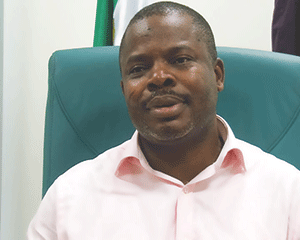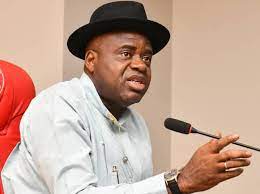Former President, National Union of Petroleum and Natural Gas Workers (NUPENG), Peter Akpatason, is House of Representatives member for Akoko Edo Federal Constituency, Edo State under All Progressives Congress (APC). In this interview with Special Correspondent, TITUS OISE, he speaks on the crisis rocking his party, delay in Petroleum Industry Bill (PIB) passage, as well as agenda for President Muhammadu Buhari on power, electoral reform and corruption.
Crisis rocking APC over sharing of offices in the National Assembly
I don’t think that what is happening can be described as crisis. What is playing out is a normal occurrence in a party. There is this saying that the battle to win elections sometimes may not be as strong as the battle to share positions after victory. The reason is that, in politics, everybody has an interest, groups have their interest and regions have their interests. In an attempt to balance these interests, you have to be extra careful in allocating positions. This case is particularly very critical because the party is just metamorphosing from the position of an opposition to the leading party at the national level. We had not, in the past, the opportunity to produce the Speaker of the House of Representatives, Majority Leader or the Chief Whip. Similarly, APC had not had the opportunity to produce the Senate President, Deputy Senate President or the other majority positions. It is the first time this is happening. So, it is huge responsibility that has fallen on the shoulders of the leaders of APC. There is no crisis yet; it is scheming, which is normal in politics for people to represent their constituencies very well.
For instance, we in the South South believe that we made serious contributions to the emergence of APC. We may not have produced the number that other regions were able to bring together, but the people need to realise that the former president is from South South. The implication of that is that the pressure here in the South South was higher than the pressure in any other geo-political zone because the former president wanted to get the whole of his own zone. So they did everything possible to get that. From Akwa Ibom down to Edo State, they wanted everything; they did everything humanly possible to get that. The amount of money that entered the South South during that election is unprecedented in the history of elections in this geo-political zone. The physical presence of very powerful members of Peoples Democratic Party (PDP), the power-brokers of the party as well as professionals like media owners and some other people who had enough power and resources were deployed to make sure they delivered the South South (to PDP). Yet, in the face of those daunting challenges, we were still able to produce some reasonable results.
Like in Edo, ordinarily, it would have been difficult, but for the exceptional contributions of Governor Adams Oshiomhole and the APC members in this state, for us to get even 25 per cent for President Muhammadu Buhari. Yet we did more than that. So, we expect that our colleagues in the House, in the Senate as well the leaders of our party should consider the peculiar situation of Edo people and people of South South during that election. That we managed to produce what we had produced was an indication that we were seriously committed and had made input into the growth of APC that eventually led to where we are today as the leading party in this country.
In the same way, the North East people would say they had been badly marginalised under the leadership of the former president because of their commitment to opposition right from time; hence they equally wanted to be represented in sharing of the national offices. Even in the South East where you had only one member, they equally wanted to be considered. It was the whole of these activities that many considered as crisis. But it is not a crisis at all; it is normal, what we should expect. But my happiness, again, is that the leadership of our party has clearly shown that there is a departure from what it used to be.
Expectations from the eighth National Assembly
We expect a National Assembly that has the character of APC as the dominant party because if you look at the immediate past dispensation, you would see that the states where we had APC governments, the level of development was higher than many other states; you could see what was happening in Edo, Imo, Rivers, Lagos and several other states under the APC. You would discover that despite that some of these states didn’t have as much revenue as some other states, they were still able to bring about serious infrastructure development and very remarkable human capital development.
For me, that was an indication that there were more progressives in APC than in any other party. And now that APC has got the opportunity to replicate what it had done at state levels, at the federal level, Nigeria stands a better chance. When it comes to the National Assembly, we are looking at a more transparent dispensation, we are looking at law-making that places the ordinary Nigerian’s interest as the central focus; we are looking at a more inclusive approach to law-making and we are looking at coming out with legislations that directly address the challenges of our people, legislations that are relevant to national development.
The way out of the mess in the oil industry
Over the years, efforts had been made to sanitise the oil industry. What my personal experience has shown is that sanitising the oil and gas industry will require strong commitment of the number one citizen of this country (president). When you say there is mess in the oil industry, it is not just NNPC GMD (Group Managing Director, Nigerian National Petroleum Corporation), or the MD (managing director) of one subsidiary or another; it is political mess – the mess is in Aso Rock. The thieves are actually in Aso Rock because NNPC management cannot steal and divert money un-noticed. Some people give them cover. So, until we have a government that is ready to free NNPC to operate and ready to sanction anybody in NNPC that misbehaves, it will be difficult for us to clean the oil and gas industry. But the first major step that we can take as a group is the passage of the Petroleum Industry Bill (PIB) that we are already working on. That is why you see that there is so much politics about the PIB. I asked this question sometimes ago; Who actually wants PIB? It is the ordinary Nigerian; the government has not demonstrated much interest in PIB.
You would start PIB and along the line, you got frustrated from left, right and centre because a whole lot of leakages would be blocked. When you have an oil and gas industry like we have in a lot of advanced countries, where the industry is completely de-politicised, where there is a National Oil Company (NOC) that is professionally run, whose role in the industry is almost the same as a multi-national or a local company or privately-run company that cannot superintend over other companies in such a way that they will have undue economic advantage over others, where we have an NOC that cannot transfer its money for political purposes, an NOC that must account for every naira that it spends, that is the only time that we can have sanity in the oil and gas industry.
What we have currently is total confusion – a situation where you have an NOC that is both a competitor and a regulator in the industry. That is the confusion. Then, politics will come where decisions cannot be taken by the NNPC without going to the Federal Executive Council (FEC).
Defections from the PDP to APC
It is not completely new, neither is it strange that people are cross-carpeting. It happens, but not in this manner and magnitude we are seeing and not for the reason that they are moving. What is happening in Nigeria today is that politicians believe in their personal interests, and the moment those interests are no longer being comprehensively protected, they move, or when you sense that you are a contractor at the national level and the party has lost at the national level, you want to quickly dash to the new platform where you can protect your business. For me, that is selfishness; that is myopic, and completely unacceptable. Moving from one party to another should not be for selfish consideration. I don’t think it is the best for us. Though my party is the beneficiary of that, I don’t think that it is the best. I want to urge my people to equally watch these people who are coming because some of them believe that they must be at the top all the time, (because) they believe that they are the masters of the game. Now that their former party can no longer provide them the opportunities, they have to come and grab them from the APC. We fought and won the battle without them, so they should stay where they are.
Agenda for the new government in the area of electoral reforms, power and corruption
In terms of electoral reforms, I don’t think the laws we have are bad. The problem is with execution. So we should rather look for policies and programmes for execution of the laws that we have, to ensure compliance to existing laws. When there is need for review, we will review based on our past experience; but the review is not the major thing now, as far as I am concerned. This is because I was involved in the last process. To some extent, we have the laws; but to what extent they are complied with and what is being done to address that non-compliance are the areas I think we should focus our energy and attention.
On power, I think the president is going to have a lot of work to do. The previous government attempted very feebly to privatise the power sector, but honestly that privatisation is standing on shaky legs.
It must be properly re-visited and reviewed because we have not seen anywhere in the world where you privatised state-owned enterprises and later raised funds for the private owners. The president must look at who those buyers are because a situation where a seller is the buyer is no trading; it is only transfer. You don’t call that trading at all where the people who are buying are the same people who are selling. A seller buying through proxy is not properly selling. Those things should be revisited. They did not do due diligence on these companies to know whether they were capable or not.
On corruption, one of the reasons many of us supported Buhari, even against a South South indigene, was that we believed that the corruption in the system was getting too much and so we needed somebody who had a track record of transparency, somebody who had character and reputation and we saw all that in Buhari. That was why we defied every pressure and concern and went ahead to support his emergence. Thank God that our efforts were supported and Buhari emerged winner and he is our president today.
Outcry on cost of governance in Nigeria
I agree that the cost of governance is high. First, we have a big government. There are too many political appointments all over the country, beginning from local government to state government up to the federal level. There is need to trim the size of our government. In terms of operation, there is need to think of how to cut the cost of operation and every other cost that is associated with governance. We must play by the rules in this country.













